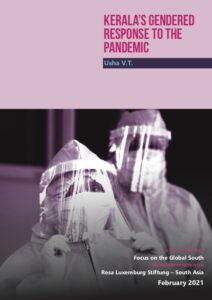25/03/2021
Under: COVID-19 Updates, India, Publications, Women
This paper draws attention to the gendered responses to the COVID-19 pandemic in the state of Kerala. Having been cautioned by the previous contagions like the Nipa Virus, Kerala had a different story to tell from the rest of India in terms of disaster-preparedness and response. The Kerala model included community action supporting state policy initiatives to achieve a humane, people-centric response to the demands of the COVID-19 situation. Herein the women’s collectives and frontline workers became the agents of action in maintaining the required medical protocol and poverty alleviation. This paper also points out how the women workers of Kudumbashree, ASHA and Anganwadis worked tirelessly to implement the directives issued from the state government. Periodic instructions regarding public safety were widely disseminated and contact-tracing carried out with extreme diligence. These measures helped control the pandemic initially. The police and other departments of the government were also directed to implement these instructions.
And eventually, when the numbers of COVID-19 cases were on the increase and community spread occurred, the Health departments did not collapse, unlike in many other states. District administrations were able to maintain the number of patients admitted to hospitals and to give them quality health care, regardless of their economic background. Special efforts were made to care for the elderly, the mentally challenged, the destitute, women, children, migrant workers and the needy. This paper highlights the significance of women’s involvement during the pandemic




![[IN PHOTOS] In Defense of Human Rights and Dignity Movement (iDEFEND) Mobilization on the fourth State of the Nation Address (SONA) of Ferdinand Marcos, Jr.](https://focusweb.org/wp-content/uploads/2025/07/1-150x150.jpg)

